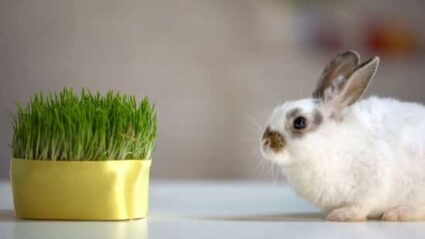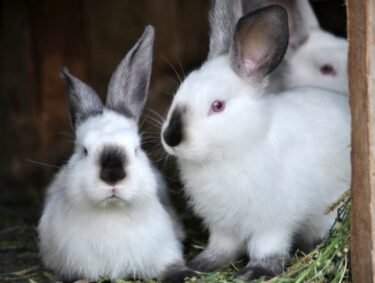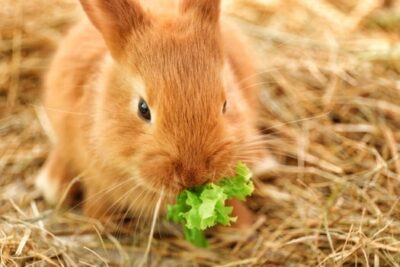Weight loss in rabbits is always a bad sign. Rabbits should remain roughly the same weight throughout their adult years. If they’re suddenly losing weight, it’s due to a problem with their care or health.
Your rabbit isn’t eating enough food or, more likely, is eating the wrong foods for its dietary requirements. Feed your rabbit more grass hay because greens and vegetables are low in calories. Also, a disease or health problem can suppress your rabbit’s appetite. The cause may be gastrointestinal issues, teeth problems, parasites, fever, head tilt, cancer or organ failure.
There are no good reasons for a rabbit to lose weight. It is particularly troublesome when your rabbit loses its balance, shows signs of fever, or are lethargic and stop moving altogether. But with the right treatment or adjustment to their diet, your rabbit will regain the weight it has lost.
Signs That a Rabbit Is Underweight
Rabbits are meant to be slim. However, if they’re malnourished, they can become too skinny.
Before you make any changes to their diet, you should make sure that your rabbit is genuinely underweight. There are several signs of an underweight rabbit, including:
- Their ribs, pelvis, and backbone are all prominent.
- Their abdomen appears caved in. A healthy rabbit’s abdomen will feel smooth, with no big difference between the level of the last rib and the abdominal cavity.
- Their coat is rough and dull. This is a sign that they aren’t getting the nutrients they need from their food.
- They won’t produce as many fecal pellets. This is an obvious side effect of not eating as much food as they usually would.
Underweight rabbits may be lethargic, i.e. they don’t move around much. They may also go through periods of extended and unusual activity, which indicates they’re searching for food and water.
They may also show signs that they’re in pain—starving hurts after all. They will sit hunched, and will be reluctant to move. You may even notice them grinding their teeth.
Do Rabbits Get Diarrhea?
There are two different ways that bunnies can experience diarrhea. The first is with intermittent soft cecotropes (ISC). While regular poops are rounded and individual, cecotropes aren’t. They’re also usually produced at night.
They look like berries, i.e., many poops stuck together. They’re also slightly softer because they are produced during a different stage of digestion. That’s why your rabbit eats its poop. Intermittent soft cecotropes are softer than average, and maybe semi-liquid.
The issue is that your rabbit can’t redigest this poop, since it’s too soft. This can cause them to lose weight over time. Rather than being a problem itself, it’s more a sign that something else is wrong. The cause is typically an incorrect diet.
Your rabbit may also experience true diarrhea. According to the Journal of Clinical Microbiology, it can be caused by viruses like the rotavirus. But other causes include:
- A poor diet containing too many carbohydrates, and not enough indigestible fiber
- The use of too many antibiotics, which changes their gut flora
- Environmental stress
- Genetic predisposition
Whatever the cause of soft feces, you should make changes in your rabbit’s diet immediately. If that doesn’t work, consult a vet for expert advice.
Can Rabbits Become Constipated?
Rabbits can experience constipation if fed an inappropriate diet. It usually occurs in the summer, when grooming and molting cause the rabbit to ingest fur. This fur makes their feces harder and more difficult to expel.
Your rabbit may have stasis. Stasis in rabbits is where the digestive system slows down or stops altogether. It differs from constipation in that your rabbit isn’t actively trying to pass poop.

Rabbit gut stasis stops the regular wave-like movements of the intestines. This is how food usually passes along the digestive tract. What causes gut stasis? Lack of water or exercise, mobility issues, and incorrect diet all can.
If your rabbit is constipated, switch their diet to an 85% hay mix. You should also encourage your rabbit to exercise. Including one or two drops of coconut or olive oil in their food can help if their poop is too dry.
Reasons Why Rabbits Lose Weight
While it’s upsetting to admit that your rabbit is underweight, you have to address the issue. That means identifying what’s causing their weight loss and taking steps to correct it. Reasons why they might be too thin include:
- The rabbit experienced malnourishment early on in their life, and never reached their potential weight.
- Your rabbit has parasites, which effectively steal nutrients from their blood or gut.
- You’re feeding your rabbit the wrong foods. Vegetables and greens have less calorific content than grass hay due to their water content.
- Your rabbit is stressed or unhappy. Stress from loud noises, like children or other pets, can stop them from wanting to eat. Rabbits need company as they are social creatures.
- You keep more than one rabbit together, and one of them hogs access to food. If one is dominant, e.g., because it’s larger, it will eat everything available and may even attack the other if it tries to eat.
Your rabbit may also have a decreased appetite due to sickness or disease. Health issues that cause decreased appetite include dental problems, gastrointestinal issues, metabolic issues, and cancer.
Do Rabbits Lose Weight in the Summer?
Rabbits don’t tend to be heavier in either the summer or the winter. They stay a consistent weight throughout the year.
What you might have noticed is that your rabbit is molting. Rabbits grow extra fur before the winter, which they need to keep themselves warm. When the winter’s over, they get rid of this extra fur to deal with the hotter temperatures.
This won’t significantly reduce their weight, and even if it does make them lose weight a little, that’s not a bad thing. But what it does do is make them appear a lot smaller. That’s why lots of people think their rabbits lose weight in the summer. They’re just smaller because they molt.
Rabbit Molting and Not Eating
Any indication that a rabbit is not showing interest in food is a bad sign. That’s especially the case when they’re molting heavily, as it’s a critical time.
Molting can cause your rabbit to ingest hair. This hair takes up space in their bowels and changes the consistency of their feces. It can become misshapen, harder and therefore more difficult to pass. It can also string together, again making it difficult for them to expel.
These digestive issues may slow down or stop their digestion altogether. When this happens, they’ll show less interest in eating whatever you offer them.
If this occurs, groom your rabbit more than you have been to remove excess hair. And double-check their diet to see they’re eating enough hay and drinking enough water. Try feeding them rabbit-appropriate treats like different fruits and vegetables to encourage them to eat.
Rabbit Weight Loss and Balance
Head tilt, also known as wry neck or torticollis, causes rabbits to lose balance. With this condition, the head is tilted to one side at a roughly 90-degree angle. It’s caused by parasitic or bacterial infection of the inner ear.
Because their balance is impaired, they find it harder to eat. Conditions like these generally depress the appetite. Head tilt could, therefore, be the cause of their weight loss too.
Losing balance and falling over isn’t necessarily a bad sign, though. The ‘dead bunny flop’ refers to something that rabbits do, where they throw themselves to one side and lie down still. This isn’t a sign of a problem, but rather that they’re happy.
Rabbit Losing Weight and Drinking Lots
When a rabbit drinks more than usual, this is referred to as polydipsia. Polydipsia is a sign of kidney failure, and appears in conjunction with the following symptoms:
- Fewer droppings, as their digestive system slows down
- Depression and lethargy
- Diarrhea, caused by excess drinking
- Fever and heart problems
While you can make adjustments to your rabbit’s diet on your own, provided you follow proper advice, you can’t cure them of kidney disease. As such, kidney failure ought to be diagnosed and treated by a veterinarian.
Rabbit Lost Weight and Not Moving
There are many reasons why a rabbit may stop moving. The first and most serious of these is a problem with their spine. Rabbits are delicate creatures, to such an extent that handling them can result in broken bones. A sudden fright like thunder and lightning can cause them to jump and hurt themselves.
Several diseases also list lethargy as one of their symptoms. Kidney failure, as referenced above, is an example. A fever can have the same effect. Whatever the case, take your rabbit to a vet immediately if they aren’t moving.
Weight Loss in Older Rabbits
Rabbits typically either gain or lose weight in their old age. There are various reasons why:
- They start to move around less, either because they are becoming blind, or they aren’t as strong as they were.
- Their appetite will naturally start to wane as they move around less.
- They are more likely to become ill or otherwise unwell.
- They may get ulcers or other sores in their mouth, which cause pain when they eat.
Whatever the cause, your rabbit will start to lose muscle mass over time. This is an unavoidable part of the aging process, so don’t be alarmed when it happens.

How To Weigh a Rabbit
You should weigh your rabbit regularly, for two reasons:
- You can monitor how well they’re gaining their weight back.
- You can spot weight loss before it becomes too serious, and take steps to prevent it from getting worse.
You can weigh them using regular kitchen scales. These are cheap to buy and easy to use. There are a couple of ways that you can weigh a rabbit.
If they sit still, you can put them in the bowl that comes with most scales. Even if they’re just still for a moment, this is usually enough time.
But if that doesn’t work, there’s a foolproof way to weigh them.
- Take their carrier and place it on the scales.
- Adjust the scales to account for the weight of the carrier.
- Put the rabbit inside the carrier and weigh them.
If your scales can’t adjust either manually or automatically to account for a weight—like you have to if you measure something in a cup or a bowl—that’s fine.
Just figure out the weight of the carrier on its own, and take that number away from the weight of the carrier plus the rabbit.
What to Feed an Underweight Rabbit
An underweight rabbit should eat more food to make up for their weight loss. Throughout their life, whether they’re overweight or underweight, a rabbit should be on an 80-85% diet of hay. The rest of their diet should be a mix of leafy greens and fruit.
However, if your rabbit doesn’t want to eat their hay, consider the following strategies:
- Offer them new foods they aren’t used to, provided that they’re safe for rabbits
- Change the brand of hay or pellets you feed them with
- Increase the amount of water they drink, as this can encourage them to poop
If your rabbit still refuses to eat, consider helping them by manually feeding them. Take a plastic syringe, i.e., one without a needle. Fill it with mixed vegetable baby food, and feed your rabbit manually. Pick food that only contains ingredients safe for rabbits.
Once finished, massage your rabbit’s belly. This will encourage their guts to start digesting. Since their digestive system works quickly, once they start pooping again, they should start eating again.
High-Calorie Foods for Rabbits
Pellets aren’t a vital part of a rabbit’s diet. But they are an excellent supplement if your rabbit isn’t eating enough. If your rabbit is underweight, consider adding pellets into their diet. If you already feed them some pellets, consider feeding them more per day.
Pick a brand that offers 14% protein as a maximum, as more is unnecessary. Make sure they contain no animal fat, and that the main ingredient is timothy hay. Avoid any pellets that contain nuts and seeds, as these are too high in carbohydrates.
Aside from that, there’s little else you can do. Rabbits don’t choose to eat fatty foods that are high in calories. Keep them on a normal diet that’s high in fiber, and they’ll return to their optimal weight.
How to Help an Underweight Baby Rabbit
How many rabbits survive out of a litter depends on their continued access to food. Allow them to nurse naturally, or offer a suitable replacement.
Newborn baby rabbits will nurse for between four and eight weeks. If they are weaned between three and five weeks, they may survive, but have a lower chance of doing so.
Leave them alone to nurse, and there should be no problems. If you notice one or two of the litter are quite weak, and aren’t nursing as much as the others, you could give them a helping hand. Rabbit kitten milk replacement gives them all the food they need.
Once they’re weaned, they can start on the same diet as your adult rabbits are on. If they’re slow starters, encourage them by offering them a variety of food. Offer them pellets to kickstart their growth.

